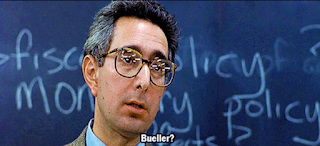How is everyone doing with building those relationships? We are one week into school now, so here are some of the activities we have done to start the year.
At lunch today I went table by table. I said each student's name and if I didn't know it or remember it, I asked their name. It became a game with them, with many of them hoping I'd get it wrong (some of them got their wish...) I'll head to lunch again Thursday and quiz myself on the students that I missed.
This is a great way to show them application of study skills: practice, get some wrong, focus on the ones you got wrong, practice again, repeat as necessary... keep practicing.
In science we practiced the art of "observation" vs. "inferences." My co-teacher developed this idea for Social Studies and adapted it to Science. It is pretty brilliant...
Students were given envelopes filled with personal effects from my past. These included a train schedule, a class photo of me with my first students (dated sometime last century,) some hockey cards, and a number of other items. These items were broken into four envelopes.
What the heck is this thing?
On top of these four envelopes, students also got to investigate two personal spaces: My desk and my car. Now, let me ask you. When was the last time you let students go through your desk? Would you let them?
Here is what my students discovered: I like snacks. and tea. a lot. In fact one drawer was FULL of these things. They saw lots of Rubik's cubes and NASA items. They saw a $1 bill in my top drawer. There were pens, pencils, former students' work, and lots of chocolate. And yes, that $1 bill was still in my desk at the end of the activity.
My car was less exciting, but they were all curious about my 'mascots.' On my dashboard I have Pain & Panic (from Disney's Hercules), White Rabbit (from Alice in Wonderland), a small rubber duck, and a children's block.
Ideally in the following days the students will have to build as much of my life story as they can: Where have I lived? Who is in my family? What are my hobbies? How far back in my life can you go? Why can't you go back further? Can you finally figure out how old I am? Why did I chose to keep those things in the car?
As the year progresses, we will connect this activity to many of the scientific concepts we will be studying: geological time scales, Earth's changing features, fault lines, and more.
I hope everyone's first few days have been wonderful. I'd love to hear how things are going!







